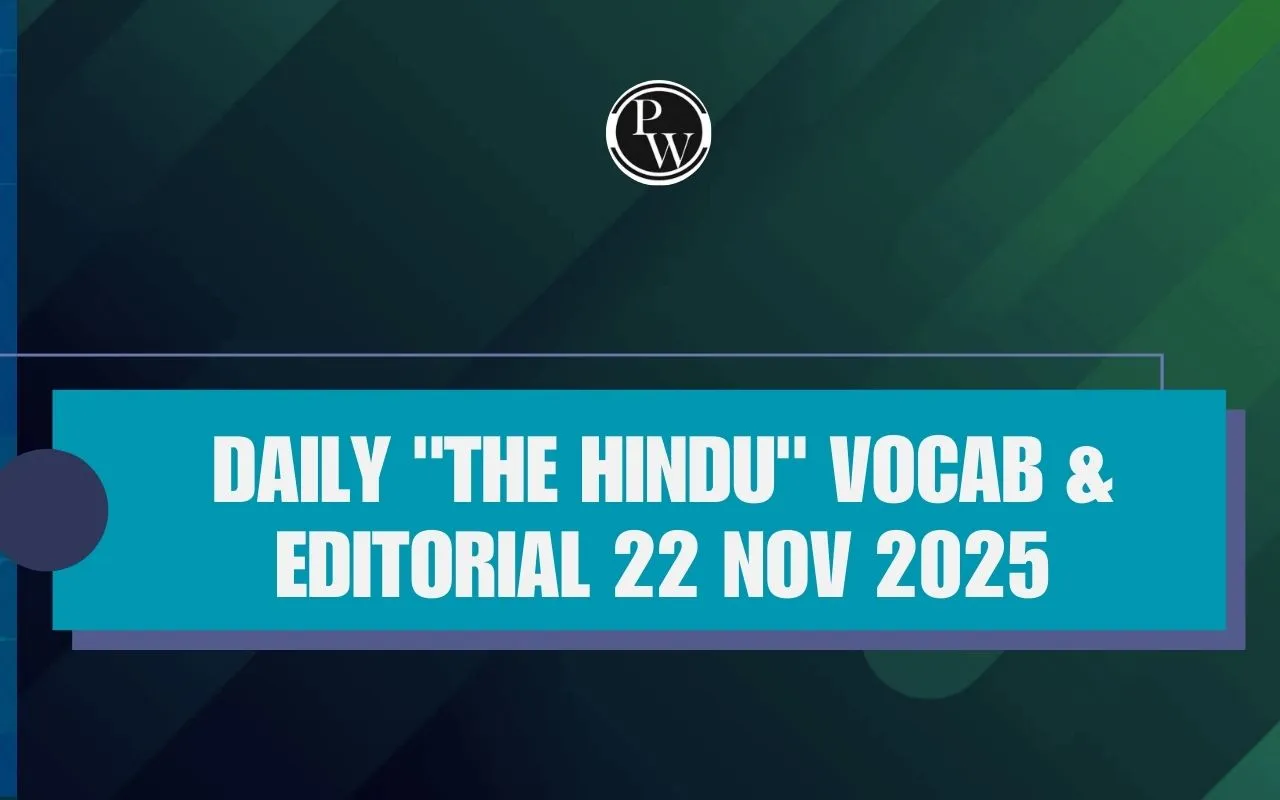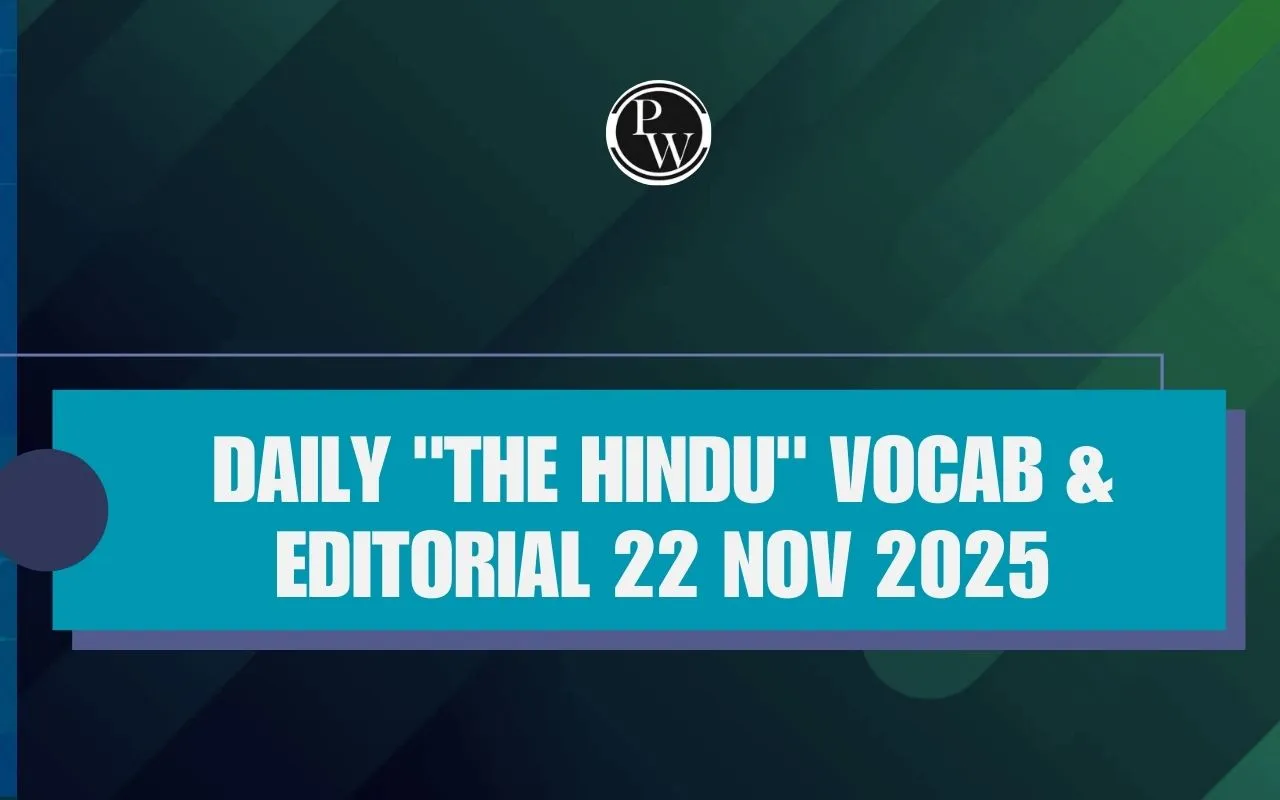

Reading Daily "The Hindu" Vocab & Editorial – 22 Nov 2025 regularly is highly beneficial for SSC and Railway exam aspirants. It enhances your vocabulary, grammar, and comprehension skills, all of which are crucial for success in competitive exams.
By incorporating this habit into your daily routine, you stay consistent with your preparation throughout the year, reducing exam stress. Regular reading not only strengthens your vocabulary but also improves your understanding of editorial pieces, making it easier to tackle questions in exams like SSC CHSL, CGL, CPO, and others. Over time, this practice boosts your reading comprehension, critical thinking, and exam confidence, setting you up for better performance in all areas of the exam.
Daily "The Hindu" Vocab & Editorial 22 Nov 2025
The Hindu Vocab & Editorial of 22 Nov 2025 provides useful word meanings and examples, making it a great resource for students preparing for competitive exams. This edition includes important words that often appear in news, politics, and opinion articles.
You will also find these words in the SSC English section. By reading this, you can learn what each word means, how it’s used, and the right way to use it in sentences. This will help you feel more confident while answering questions in exams and improve your comprehension skills.
Daily "The Hindu" Vocab & Editorial 22 Nov 2025
The Hindu Vocabulary 22 November 2025
Below we have provided Hindu Vocabulary 22 November 2025 for the ease of the candidates. Check the complete list below:
1. Soliciting
-
Part of Speech: Verb
-
Meaning: Requesting or asking for something.
-
Synonyms: Requesting, asking, seeking
-
Antonyms: Rejecting, denying
-
Example: The organization was soliciting donations for the charity event.
2. Redaction
-
Part of Speech: Noun
-
Meaning: The process of editing or preparing written material for publication, often involving the removal or alteration of sensitive information.
-
Synonyms: Editing, revision, modification
-
Antonyms: Reduction
-
Example: The document was sent for redaction to ensure no confidential information was leaked.
3. Refuted
-
Part of Speech: Verb
-
Meaning: To prove something wrong or false.
-
Synonyms: Denied, disproved, rejected
-
Antonyms: Accepted, confirmed, supported
-
Example: The lawyer refuted all the accusations made against his client.
4. Stemming
-
Part of Speech: Verb
-
Meaning: To originate or arise from.
-
Synonyms: Originating, deriving, coming from
-
Antonyms: Associating, linking
-
Example: The problem stemmed from a lack of communication within the team.
5. Mounted
-
Part of Speech: Verb
-
Meaning: To start, launch, or organize something.
-
Synonyms: Started, launched, initiated
-
Antonyms: Demolished, destroyed
-
Example: The event was mounted successfully despite the challenges.
6. Trafficking
-
Part of Speech: Noun
-
Meaning: The illegal trade or exchange of goods or services.
-
Synonyms: Smuggling, dealing
-
Antonyms: Jammed (as in blocked or obstructed)
-
Example: The authorities arrested several individuals for human trafficking.
7. Assent
-
Part of Speech: Noun
-
Meaning: The expression of agreement or approval.
-
Synonyms: Consent, approval, agreement
-
Antonyms: Denial, refusal, disagreement
-
Example: The committee gave its assent to the proposed changes.
8. Saga
-
Part of Speech: Noun
-
Meaning: A long and detailed story or series of events, often involving a heroic journey.
-
Synonyms: Chronicle, epic, narrative
-
Antonyms: Decode (as in to simplify or explain)
-
Example: The saga of their friendship lasted through many years and challenges.
9. Disgraced
-
Part of Speech: Adjective
-
Meaning: Having lost respect or honor due to shameful actions.
-
Synonyms: Shamed, dishonored, humiliated
-
Antonyms: Honored, respected, dignified
-
Example: The athlete was disgraced after being caught doping.
10. Exposure
-
Part of Speech: Noun
-
Meaning: The action of revealing or making something known, often referring to information.
-
Synonyms: Revelation, disclosure, unveiling
-
Antonyms: Explanation, concealment
-
Example: The exposure of the corruption scandal shocked the entire nation.
11. Blow
-
Part of Speech: Noun
-
Meaning: A setback or damaging impact.
-
Synonyms: Setback, defeat, hindrance
-
Antonyms: Boost, support, aid
-
Example: The Supreme Court’s ruling was a blow to federalism.
12. Fetter
-
Part of Speech: Verb
-
Meaning: To restrict or limit someone’s freedom.
-
Synonyms: Restrain, hinder, restrict, curb
-
Antonyms: Free, liberate, empower
-
Example: The court ruled that governors cannot fetter the legislature's autonomy.
13. Usurp
-
Part of Speech: Verb
-
Meaning: To take power or authority illegally, often by force.
-
Synonyms: Seize, grab, overthrow, appropriate
-
Antonyms: Surrender, yield, relinquish
-
Example: The military attempted to usurp the civilian government.
14. Prolonged
-
Part of Speech: Adjective
-
Meaning: Continuing for a long time.
-
Synonyms: Extended, lengthy, sustained
-
Antonyms: Brief, short, quick
-
Example: The prolonged negotiations finally resulted in a breakthrough.
15. Evasive
-
Part of Speech: Adjective
-
Meaning: Avoiding responsibility or direct action.
-
Synonyms: Dodging, unclear, indirect
-
Antonyms: Direct, straightforward, honest
-
Example: The politician’s evasive answers raised suspicions.
16. Substantively
-
Part of Speech: Adverb
-
Meaning: In a meaningful or significant way.
-
Synonyms: Essentially, fundamentally
-
Antonyms: Slightly, marginally
-
Example: The ruling was substantively different from the previous judgment.
17. Invoked
-
Part of Speech: Verb
-
Meaning: To call upon a law or principle for support.
-
Synonyms: Cited, applied, referred to
-
Antonyms: Ignored, disregarded
-
Example: The lawyer invoked the law to support his argument.
18. Prescribe
-
Part of Speech: Verb
-
Meaning: To set or define a rule or requirement.
-
Synonyms: Mandate, specify, stipulate
-
Antonyms: Withdraw, remove
-
Example: The teacher prescribed a strict timetable for the students.
19. Unenforceable
-
Part of Speech: Adjective
-
Meaning: Not possible to be put into effect or implemented.
-
Synonyms: Impractical, invalid
-
Antonyms: Enforceable, valid
-
Example: The court ruled that the contract was unenforceable due to its vagueness.
20. Assertion
-
Part of Speech: Noun
-
Meaning: A confident statement or declaration.
-
Synonyms: Claim, declaration, statement
-
Antonyms: Denial, contradiction
-
Example: His assertion about the company’s future success was bold and confident.
21. Discretion
-
Part of Speech: Noun
-
Meaning: The freedom or power to decide according to one's judgment.
-
Synonyms: Judgment, choice, latitude
-
Antonyms: Obligation, restriction
-
Example: The judge exercised his discretion to determine the penalty for the crime.
Para Jumble 22 November 2025
Para Jumble Example:
-
Sentence Order:
-
P: Whatever he said at the committee meeting
-
Q: The views of the organization
-
R: Were his personal views
-
S: On the subject that he claimed to have represented.
-
Correct Answer: C - RSPQ
-
Explanation: The correct order is RSPQ as it starts with the claim about his personal views and ends with what was represented.
Para Jumble Example:
-
Sentence Order:
-
P: Hurray! Here is the toy
-
Q: What I was looking for
-
R: As my birthday gift
-
Answer: C - Use "that" in place of "what"
-
Explanation: The phrase "what I was looking for" needs to be replaced with "that I was looking for" to correct the sentence.
Idioms & Phrases:
-
High and low
-
Meaning: Everywhere
-
Answer: A
-
Explanation: "High and low" refers to something happening or being searched for everywhere.
-
To cut one’s wisdom teeth
-
Meaning: To gain experience with difficulty
-
Answer: A
-
Explanation: The phrase refers to going through the tough stages of life or a learning process, often with difficulty.
-
In the ascendant
-
Meaning: Rising in power or influence
-
Answer: B
-
Explanation: This idiom means that something or someone is gaining power, influence, or prominence.
-
Why are you jumping down my throat?
-
Meaning: Scolding or confronting aggressively
-
Answer: B
-
Explanation: To jump down someone’s throat means to criticize or confront them sharply.
-
To clutch at straws
-
Meaning: To desperately try useless options
-
Answer: B
-
Explanation: This idiom means making desperate attempts to solve a problem, even if the options are useless.
One Word Substitution:
-
Huge fire for celebration
-
Answer: D - Bonfire
-
Explanation: A bonfire is a large fire used for celebration or gathering.
-
A puzzling or inexplicable occurrence or situation
-
Answer: B - Enigma
-
Explanation: An enigma refers to something that is mysterious or difficult to understand.
-
A person who indulges in sensuous luxury and pleasure
-
Answer: C - Sybarite
-
Explanation: A sybarite is someone who enjoys luxury and pleasure, often in an excessive way.
-
A person who boasts about his achievements
-
Answer: B - Braggart
-
Explanation: A braggart is someone who talks about their achievements in a boastful way.
-
An institution for the care of people who are mentally ill
-
Answer: A - Asylum
-
Explanation: An asylum is a place where people with mental health issues are cared for.
The Hindu Editorial Paragraph Analysis 22 Nov 2025
Blow to States: On the Supreme Court and State Bills
The Supreme Court should have upheld timelines for Governors and the President. By holding that the judiciary cannot fetter Governors and the President to “one-size-fits-all” timetables or usurp their functions by assuming “deemed consent” of proposed Bills by States, and also clarifying that these authorities cannot resort to “prolonged and evasive inaction,” the Supreme Court’s response to the 16th Presidential Reference appears as a constitutional balancing act. But, substantively, it is a blow to federalism as it effectively allows Governors unchecked powers to block or delay State legislation without constitutional accountability.
This opinion contradicts a progressive judgment in April 2025 that had prescribed three-month timelines and used Article 142 to grant deemed assent to some Bills passed in the Tamil Nadu Assembly. The Court invoked separation of powers to reject timelines and Article 142’s use, but this empowers Governors at the cost of State rights. The judgment claims that Articles 200 and 201 prescribe no deadlines, but disregards explicit constitutional text. In Article 200, the Governor must declare his decision “as soon as possible”—the Court called it too “elastic” to support timelines, rendering constitutional text unenforceable. The Court’s assertion that Governors are not bound by the Council of Ministers’ aid and advice contradicts constitutional history. The framers explicitly removed the phrase “in his discretion” — a phrase in the Government of India Act, 1935 — from Articles 200 and 201.
Questions:
-
What does the Supreme Court’s response to the 16th Presidential Reference primarily aim to achieve?
-
A. Strengthen judicial control over State Bills
-
B. Provide a constitutional balancing act
-
C. Grant more powers to the Union Government
-
D. Remove Governors from legislative processes
-
Answer: B
-
According to the passage, what is the negative impact of the judgment on federalism?
-
A. It reduces Presidential power
-
B. It removes legislative privileges of MLAs
-
C. It allows Governors unchecked power to delay State Bills
-
D. It abolishes Article 142
-
Answer: C
-
The judgment contradicts an earlier ruling from which year?
-
A. 2022
-
B. 2023
-
C. 2024
-
D. 2025
-
Answer: D
-
What did the earlier (April 2025) judgment prescribe for Governors?
-
A. Unlimited decision-making time
-
B. Mandatory assent to all State Bills
-
C. A three-month timeline for decisions
-
D. No involvement in State legislation
-
Answer: C
-
Which constitutional provision was earlier used to grant “deemed assent” to Bills?
-
A. Article 32
-
B. Article 200
-
C. Article 356
-
D. Article 142
-
Answer: D
